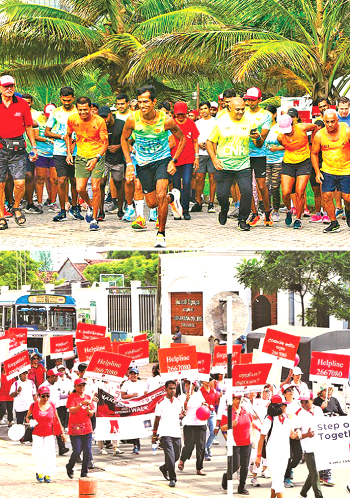Alzheimer’s disease and other forms of dementia become increasingly prevalent with age. In Sri Lanka, which is experiencing one of the fastest-growing aging populations in the region, it is projected that by 2050 nearly half a million people will live with dementia.
In recognition of World Alzheimer’s Month in September and World Alzheimer’s Day on September 21, the Lanka Alzheimer’s Foundation (LAF), a member of Alzheimer’s Disease International (ADI), will hold a series of events.
 Colombo’s iconic Lotus Tower will be illuminated in red on September 1, to draw public attention regarding Alzheimer’s disease which is a specific type of dementia characterised by progressive memory loss and cognitive decline. Promoting both physical and mental exercise which are crucial for delaying or preventing dementia, LAF’s will hold “Run to Remember”- a 5 km run on September 7 at 4.30 p.m. from the Taj Samudra Hotel and “Memory Walk 2024” on September 14 at 7.30 a.m. from the Cinnamon Grand Hotel. LAF’s vital services, largely powered by volunteers and supported by donations, include raising awareness, providing education on risk reduction, memory screening and assessment, running an activity centre, supporting caregiver groups, operating a helpline, offering identification bracelets, befriending, and counselling. These initiatives aim to assist persons living with dementia and their caregivers.
Colombo’s iconic Lotus Tower will be illuminated in red on September 1, to draw public attention regarding Alzheimer’s disease which is a specific type of dementia characterised by progressive memory loss and cognitive decline. Promoting both physical and mental exercise which are crucial for delaying or preventing dementia, LAF’s will hold “Run to Remember”- a 5 km run on September 7 at 4.30 p.m. from the Taj Samudra Hotel and “Memory Walk 2024” on September 14 at 7.30 a.m. from the Cinnamon Grand Hotel. LAF’s vital services, largely powered by volunteers and supported by donations, include raising awareness, providing education on risk reduction, memory screening and assessment, running an activity centre, supporting caregiver groups, operating a helpline, offering identification bracelets, befriending, and counselling. These initiatives aim to assist persons living with dementia and their caregivers.
The College of Community Physicians Sri Lanka (CCPSL) joins LAF in its activities, recognising the importance of this major non-communicable disease (NCD). Often neglected and under-recognised, dementia threatens the health of older adults and will contribute to the public health burden in Sri Lanka.
The time to act on dementia and Alzheimer’s is now. By harnessing the power of knowledge, we can collectively work to recognise the warning signs of dementia, ensure early diagnosis, and offer essential support post-diagnosis. Alzheimer’s disease is not a normal part of aging; it is a condition with no current cure but with measures to reduce the risk and slow its progression.









